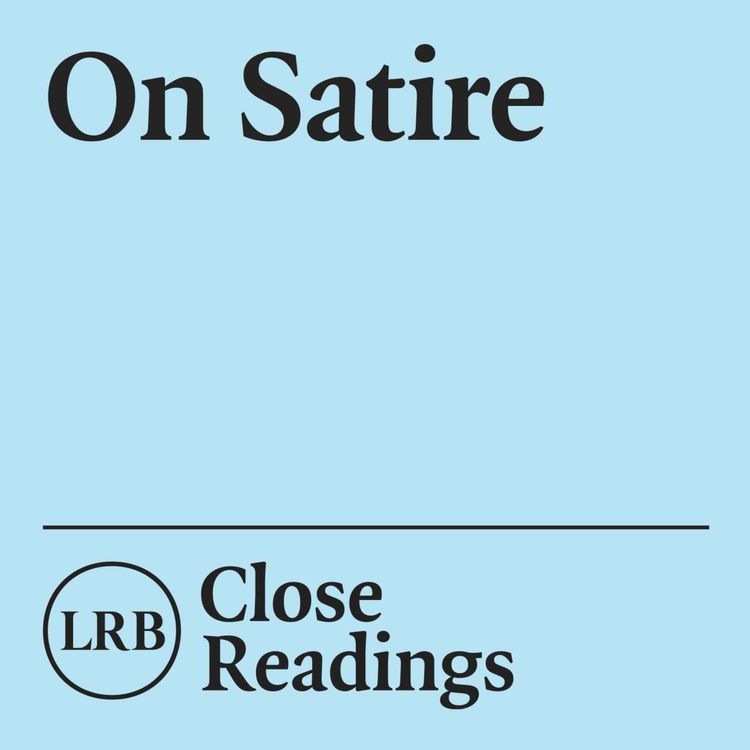Share

On Satire
The Earl of Rochester
According to one contemporary, the Earl of Rochester was a man who, in life as well is in poetry, ‘could not speak with any warmth, without repeated Oaths, which, upon any sort of provocation, came almost naturally from him.’ It’s certainly hard to miss Rochester's enthusiastic use of obscenities, though their precise meanings can sometimes be obscure. As a courtier to Charles II, his poetic subject was most often the licentiousness and intricate political manoeuvring of the court’s various factions, and he was far from a passive observer. In this episode Clare and Colin consider why Restoration England was such a satirical hotbed, and describe the ways in which Rochester, with a poetry rich in bravado but shot through with anxiety, transformed the persona of the satirist.
Non-subscribers will only hear an extract from this episode. To listen in full, and to all our other Close Readings series, sign up:
Directly in Apple Podcasts: https://apple.co/3pJoFPq
In other podcast apps: lrb.me/closereadings
Read more in the LRB:
Germaine Greer: Doomed to Sincerity
https://www.lrb.co.uk/the-paper/v21/n18/germaine-greer/doomed-to-sincerity
Terry Eagleton: In an Ocean of Elizabeths
https://www.lrb.co.uk/the-paper/v36/n20/terry-eagleton/in-an-ocean-of-elizabeths
Christopher Hill: Reason, Love and Life
https://www.lrb.co.uk/the-paper/v02/n22/christopher-hill/reason-love-and-life
Colin Burrow and Clare Bucknell are both fellows of All Souls College, Oxford.
Get in touch: podcasts@lrb.co.uk
More episodes
View all episodes

12. 'A Handful of Dust' by Evelyn Waugh
16:08||Ep. 12In 1946 Evelyn Waugh declared that 20th-century society – ‘the century of the common man’, as he put it – was so degenerate that satire was no longer possible. But before reaching that conclusion he had written several novels taking aim at his ‘crazy, sterile generation’ with a sparkling, acerbic and increasingly reactionary wit. In this episode, Colin and Clare look at A Handful of Dust (1934), a disturbingly modernist satire divorced from modernist ideas. They discuss the ways in which Waugh was a disciple of Oscar Wilde, with his belief in the artist as an agent of cultural change, and why he’s at his best when describing the fevered dream of a dying civilisation.Non-subscribers will only hear an extract from this episode. To listen to the full episode, and all our other Close Readings series, subscribe:Directly in Apple Podcasts: https://apple.co/4dbjbjGIn other podcast apps: lrb.me/closereadingsFurther reading in the LRB:Seamus Perry:https://www.lrb.co.uk/the-paper/v45/n16/seamus-perry/isn-t-london-hellJohn Bayley:https://www.lrb.co.uk/the-paper/v16/n20/john-bayley/mr-toad
11. 'The Importance of Being Earnest' by Oscar Wilde
14:37||Ep. 11By the end of 1895 Oscar Wilde’s life was in ruins as he sat in Reading Gaol facing public disgrace, bankruptcy and, two years later, exile. Just ten months earlier the premiere of The Importance of Being Earnest at St James’s Theatre in London had been greeted rapturously by both the audience and critics. In this episode Colin and Clare consider what Wilde was trying do with his comedy, written on the cusp of this dark future. The ‘strange mixture of romance and finance’ Wilde observed in the letters of his lover, Alfred Douglas, could equally be applied to Earnest, and the satire of Jane Austen before it, but is it right to think of Wilde’s play as satirical? His characters are presented in an ethical vacuum, stripped of any good or bad qualities, but ultimately seem to demonstrate the impossibility of living a purely aesthetic life free from conventional morality.Non-subscribers will only hear an extract from this episode. To listen to the full episode, and all our other Close Readings series, subscribe:Directly in Apple Podcasts: https://apple.co/4dbjbjGIn other podcast apps: lrb.me/closereadingsRead more in the LRB:Colm Tóibín on Wilde's letters: https://www.lrb.co.uk/the-paper/v23/n08/colm-toibin/love-in-a-dark-timeColm Tóibín the Wilde family: https://www.lrb.co.uk/the-paper/v39/n23/colm-toibin/the-road-to-reading-gaolFrank Kermode: https://www.lrb.co.uk/the-paper/v09/n19/frank-kermode/a-little-of-this-honeyColin Burrow and Clare Bucknell are both fellows of All Souls College, Oxford.Get in touch: podcasts@lrb.co.uk
10. Byron's 'Don Juan'
17:54||Ep. 10Few poets have had the courage (or inclination) to rhyme ‘Plato’ with ‘potato’, ‘intellectual’ with ‘hen-peck’d you all’ or ‘Acropolis’ with ‘Constantinople is’. Byron does all of these in Don Juan, his 16,000-line unfinished mock epic that presents itself as a grand satire on human vanity in the tradition of Cervantes, Swift and the Stoics, and refuses to take anything seriously for longer than a stanza. But is there more to Don Juan than an attention-seeking poet sustaining a deliberately difficult verse form for longer than Paradise Lost in order ‘to laugh at all things’? In this episode Clare and Colin argue that there is: they see in Don Juan a satire whose radical openness challenges the plague of ‘cant’ in Regency society but drags itself into its own line of fire in the process, leaving the poet caught in a struggle against the sinfulness of his own poetic power, haunted by its own wrongness.Non-subscribers will only hear an extract from this episode. To listen to the full episode, and all our other Close Readings series, subscribe:Directly in Apple Podcasts: https://apple.co/4dbjbjGIn other podcast apps: lrb.me/closereadingsRead more in the LRB:Clare Bucknell: Rescuing Lord Byronhttps://www.lrb.co.uk/the-paper/v45/n23/clare-bucknell/his-own-dark-mindMarilyn Butler: Successhttps://www.lrb.co.uk/the-paper/v04/n21/marilyn-butler/successJohn Mullan: Hidden Consequenceshttps://www.lrb.co.uk/the-paper/v25/n21/john-mullan/hidden-consequencesThomas Jones: On Top of Everythinghttps://www.lrb.co.uk/the-paper/v21/n18/thomas-jones/on-top-of-everythingColin Burrow and Clare Bucknell are both fellows of All Souls College, Oxford.Get in touch: podcasts@lrb.co.uk
9. Jane Austen's 'Emma'
14:51||Ep. 9What kind of satirist was Jane Austen? Her earliest writings follow firmly in the footsteps of Tristram Shandy in their deployment of heightened sentiment as a tool for satirising romantic novelistic conventions. But her mature fiction goes far beyond this, taking the fashion for passionate sensibility and confronting it with moneyed realism to depict a complex social satire in which characters are constantly pulled in different directions by romantic and economic forces. In this episode Clare and Colin focus on Emma as the high point of Austen’s satire of character as revealed through conversational style, and consider how the world Austen was born into, of revolutionary thought and new money, shaped the moral and material universe of all her novels.Non-subscribers will only hear an extract from the episode. To listen in full, and to all our other Close Readings series, sign up:Directly in Apple Podcasts: https://apple.co/3pJoFPqIn other podcast apps: lrb.me/closereadingsRead more in the LRB:Barbara Everetthttps://www.lrb.co.uk/the-paper/v18/n03/barbara-everett/hard-romanceJohn Bayleyhttps://www.lrb.co.uk/the-paper/v09/n03/john-bayley/yawning-and-screamingMarilyn Butlerhttps://www.lrb.co.uk/the-paper/v09/n12/marilyn-butler/jane-austen-s-word-processColin Burrow and Clare Bucknell are both fellows of All Souls College, Oxford.Get in touch: podcasts@lrb.co.uk
8. 'The Life and Opinions of Tristram Shandy, Gentleman' by Laurence Sterne
14:53||Ep. 8'Tristram Shandy' was such a hit in its day that you could buy tea trays, watch cases and cushions decorated with its most famous characters and scenes. If much of the satire covered in this series so far has featured succinct and damning portrayals of recognisable city types, Sterne’s comic masterpiece seems to offer the opposite: a sprawling and irreducible depiction of idiosyncratic country-dwellers that makes a point of never making its point. Yet many of the familiar satirical tricks are there – from radical shifts in scale to the liberal use of innuendo – and in this episode Clare and Colin look at the ways in which the novel stays true to the traditions of satire while drawing on Cervantes, Rabelais, Locke and the fashionable notion of ‘sentiment’ to advance a new kind of nuanced social comedy.Non-subscribers will only hear an extract from this episode. To listen in full, and to all our other Close Readings series, sign up:Directly in Apple Podcasts: https://apple.co/3pJoFPqIn other podcast apps: lrb.me/closereadingsRead more in the LRB:Clare Bucknell on syphilis:https://www.lrb.co.uk/the-paper/v41/n14/clare-bucknell/colonel-cundum-s-domainJohn Mullan on Sterne:https://www.lrb.co.uk/the-paper/v24/n11/john-mullan/shandying-itColin Burrow and Clare Bucknell are both fellows of All Souls College, Oxford.Get in touch: podcasts@lrb.co.uk
7. 'The Dunciad' by Alexander Pope
12:38||Ep. 7Nobody hated better than Alexander Pope. Despite his reputation as the quintessentially refined versifier of the early 18th century, he was also a class A, ultra-pure, surreal, visionary mega-hater, and The Dunciad is his monument to the hate he felt for almost all the other writers of his time. Written over fifteen years of burning fury, Pope’s mock-epic tells the story of the Empire of Dullness and its lineage of terrible writers, the Dunces. Unlike other satires featured in this series so far, it makes no effort to hide the identities of its targets. Clare and Colin provide an ABC for understanding this vast and knotty fulmination, and explore the feverish, backstabbing and politically turbulent world in which it was created.Non-subscribers will only hear an extract from this episode. To listen in full, and to all our other Close Readings series, sign up:Directly in Apple Podcasts: https://apple.co/3pJoFPqIn other podcast apps: lrb.me/closereadingsRead more in the LRB:John Mullan: Clubs of Quidnuncshttps://www.lrb.co.uk/the-paper/v22/n04/john-mullan/clubs-of-quidnuncsBarbara Everett: Tibbleshttps://www.lrb.co.uk/the-paper/v07/n18/barbara-everett/tibblesColin Burrow: Puppeteer Poethttps://www.lrb.co.uk/the-paper/v44/n08/colin-burrow/puppeteer-poetColin Burrow and Clare Bucknell are both fellows of All Souls College, Oxford.Get in touch: podcasts@lrb.co.uk
6. John Gay's 'The Beggar's Opera'
12:59||Ep. 6In 'The Beggar’s Opera' we enter a society turned upside down, where private vices are seen as public virtues, and the best way to survive is to assume the worst of everyone. The only force that can subvert this state of affairs is romantic love – an affection, we discover, that satire finds hard to cope with. John Gay’s 1727 smash hit ‘opera’, which ran for 62 performances in its first run, put the highwaymen, criminal gangs and politicians of the day up on stage, and offered audiences a tuneful but unnerving reflection of their own corruption and mortality. Clare and Colin discuss how this satire on the age of Walpole came about, what it did for its struggling author, and why it’s an infinitely elusive, strangely modernist work.Non-subscribers will only hear an extract from this episode. To listen in full, and to all our other Close Readings series, sign up:Directly in Apple Podcasts: https://apple.co/3pJoFPqIn other podcast apps: lrb.me/closereadingsRead more in the LRB:Frank Kermode: Liveriedhttps://www.lrb.co.uk/the-paper/v17/n09/frank-kermode/liveriedE.S. Turner: Delightful to be Robbedhttps://www.lrb.co.uk/the-paper/v24/n09/e.s.-turner/delightful-to-be-robbedColin Burrow and Clare Bucknell are both fellows of All Souls College, Oxford.Get in touch: podcasts@lrb.co.uk
4. Ben Jonson's 'Volpone'
11:51||Ep. 4What did English satirists do after the archbishop of Canterbury banned the printing of satires in June 1599? They turned to the stage. Within months of the crackdown, the same satirical tricks Elizabethans had read in verse could be enjoyed in theatres. At the heart of the scene was Ben Jonson, who for many centuries has maintained a reputation as the refined, classical alternative to Shakespeare, with his diligent observance of the rules extracted from Roman comedy. In this episode, Colin and Clare argue that this reputation is almost entirely false, that Jonson was as embroiled in the volatile and unruly energies of late Elizabethan London as any other dramatist, and nowhere is this more on display than in his finest play, Volpone.Non-subscribers will only hear an extract from this episode. To listen in full, and to all our other Close Readings series, sign up:Directly in Apple Podcasts: https://apple.co/3pJoFPqIn other podcast apps: lrb.me/closereadingsRead more in the LRB:Blair Worden: The Tribe of Benhttps://www.lrb.co.uk/the-paper/v34/n19/blair-worden/the-tribe-of-benTerence Hawkes: Jonson and digestionhttps://www.lrb.co.uk/the-paper/v20/n10/terence-hawkes/lore-and-ordureColin Burrow and Clare Bucknell are both fellows of All Souls College, Oxford.Get in touch: podcasts@lrb.co.uk